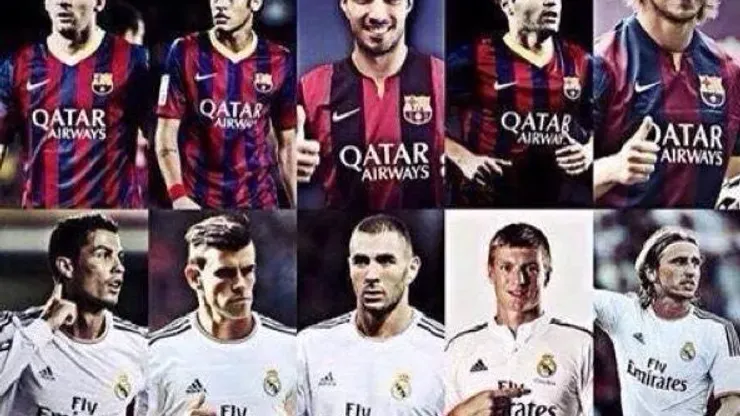
The el Clásico history is perhaps the most storied in the lore of the sport. Our world has been saturated by the media’s constant attention to the wars and rivalries between nations, many of which have existed for centuries. This is a truth that most of us have simply learned to accept and a few have even embraced, but for others, these never-ending battles between the people of this small, pale blue dot is not fought on the seas, in the air, or on hallowed grounds, it is fought on a 100-yard grass field by twenty two of the most athletic and respected footballers of today’s modern game.
For some sports teams, a rivalry can be traced back decades into their history. The truly great battles–Ali vs Frazier, the Yankees vs the Red Sox–utterly surpass the sport, and in some cases, define it. However, there is only one contention that encapsulates three hundred years of a nation’s history and, in many ways, personifies the strife itself: FC Barcelona vs Real Madrid.
The bitterness between the Galacticos and the Blaugrana is more than just a simple rivalry of clubs or fanatics; it’s more than a commercial success or the 1 billion plus viewers the game generates. The Clásico is the stage where year after year the people of Catalonia (the region where Barcelona resides) declare their independence from Spain.
Catalonia existed as a sovereign state with its own language, culture, and identity until September 11, 1714, when King Philip V conquered the Catalan region. Shortly thereafter, the few remaining territories of the Iberian Peninsula were annexed, thus creating the country that we know today as Spain.
During the next 200 years, Spanish was slowly introduced into Catalonia and was eventually made the official language of the region. The Catalan people were allowed to use their language at their own leisure, but all legal documents, schools, and even the media were forced to use Spanish. This infuriated the proud people of Catalonia, but they were helpless to stop the actions of the Spanish capital.
In the early part of the 20th century, Catalonia made great strides in their consistent hunt for independence. Unfortunately, their plans of secession came to a halt when Franco, a conservative, right-wing militant, became Spain’s first and only dictator at the end of the Spanish Civil War in 1939, and for the next 36 years, he ruled over the country with a combination of fear, oppression, and sheer military might.
Those who opposed the dictatorship were mainly derived from the Basque and Catalan region, but rebellions arose throughout the whole of Spain. These rebels, when captured, were tortured for information and then killed. On the other hand, Franco’s allies were pampered with gifts and a treasure trove of excessive commodities.
READ MORE — How to watch Real Madrid vs Barcelona online.
It was during this turbulent time in Spanish history that FC Barcelona became more than a club; it was transformed into a symbol of pride for the Catalan people and a representation of hope for a better tomorrow.
At the opposite end of the spectrum, Real Madrid fought on the side of the regime and everything that it stood for.
After Franco’s death in 1975, and subsequently the end of the dictatorship, Catalonia’s rights, including the use of Catalan in all outlets, were re-established, but their hunger for independence has yet to be fulfilled.
Today, Real Madrid, in their all-white uniform, still represents a pure and united Spain. In contrast, FC Barcelona proudly bestows the Catalan flag (the only flag one sees in Catalonia) on their jerseys as a memorial of their continuous struggle for an independent state.
With such a tumultuous history, what will the future hold for the Clásico?
Well, if the current situation in Spain continues, there may be no Clásico to speak of.
Catalonia has made tremendous progress in its search for independence and “if Catalonia became independent”, said La Liga president Javier Tebas, “taking into consideration the Sports Laws that would be enforced by the rest of Spain, Barcelona wouldn’t be allowed to play [in La Liga]”. In other words, there would be no Clásico between FC Barcelona and Real Madrid. The ultimate rivalry would finally come to an end.
Regardless of the political outcome, on Saturday, October 25, 2014 the Santiago Bernabéu Stadium will play host to the first Clásico of the season.
Who will walk away elated, with victory draped on their shoulders? Only time will tell. But what you can be assured of is that for 90 minutes the two giants of soccer will fight a battle 300 years in the making.
200+ Channels With Sports & News
- Starting price: $33/mo. for fubo Latino Package
- Watch Premier League, Liga MX & Copa Libertadores
The New Home of MLS
- Price: $14.99/mo. for MLS Season Pass
- Watch every MLS game including playoffs & Leagues Cup
Many Sports & ESPN Originals
- Price: $10.99/mo. (or get ESPN+, Hulu & Disney+ for $14.99/mo.)
- Features Bundesliga, LaLiga, NWSL, & USL
2,000+ soccer games per year
- Price: $7.99/mo
- Features Champions League, Serie A, Europa League & EFL
175 Premier League Games & PL TV
- Starting price: $7.99/mo. for Peacock Premium
- Watch 175 exclusive EPL games per season
